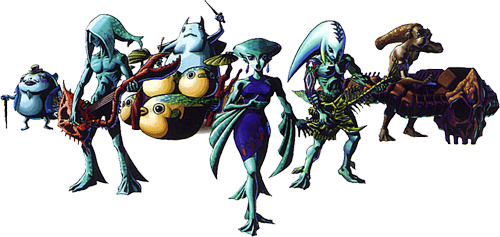Voice Acting: Progress or a Burden?
Posted on January 29 2011 by Hanyou
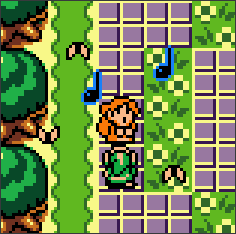 Some gamers suggest that a strictly text-based approach to conversations in video games is a relic of a bygone era, like silent film, and it is time for Nintendo to replace the text with actual speech. Others argue that speech would detract from the characters and the experience. Both have decent arguments. On the surface, the two positions seem irreconcilable; either the Zelda franchise must move in a more cinematic direction, detracting from the creativity allowed to the player, or it must remain fixed firmly to the past. Could there be a “middle” position? Is it possible that Nintendo could utilize voice acting in a way that would satisfy both parties, and move bravely into the future without abandoning past charm?
Some gamers suggest that a strictly text-based approach to conversations in video games is a relic of a bygone era, like silent film, and it is time for Nintendo to replace the text with actual speech. Others argue that speech would detract from the characters and the experience. Both have decent arguments. On the surface, the two positions seem irreconcilable; either the Zelda franchise must move in a more cinematic direction, detracting from the creativity allowed to the player, or it must remain fixed firmly to the past. Could there be a “middle” position? Is it possible that Nintendo could utilize voice acting in a way that would satisfy both parties, and move bravely into the future without abandoning past charm?
Those who favor voice acting usually forward the following arguments. First, voice acting can make for an involving experience in any game, and arguably takes nothing away from the gameplay or character development at all. Anyone who’s played Bioware’s Knights of the Old Republic or Mass Effect games probably has some personal experience with this. In these games, voice acting does not detract from exchanges between characters, but instead adds to them. The same is true of Japanese franchises like the Tales series. Voice acting gives the characters another dimension to their personality; actually hearing the inflections in someone’s voice is a vastly different experience from simply reading stagnant text with select words italicized or capitalized and select sentences punctuated. Secondly, the industry as a whole is moving forward, and Nintendo is being left in the dust by competitors who have found perfectly workable ways to incorporate voice acting into their games. Zelda, their most epic and quite possibly most beloved franchise, deserves the same big-budget, Hollywood treatment that other franchises receive. Third, some gamers simply say they don’t like reading. This last argument is blatantly terrible, but does shed light on the fact that Nintendo might lose potential fans if they fail to implement voice acting. For purely practical reasons, then, it may be necessary.
Detractors of voice acting also have a point. First, we have seen voice acting in Zelda games once before, and revisiting the CD-i disasters is not on any Zelda fan’s list of preferences for the series. Anything that reminds us of those games–from their terrible controls to their awkward cutscenes to the ridiculously over-the-top dialog–immediately has points counted against it. This is a straw man; Nintendo was not responsible for the CD-i games, and there is no reason to believe that simply implementing voice acting in a future, big-budget release would have the same effect. However, it does affect how people perceive voice acting in the context of the Zelda franchise. Secondly, text does allow the gamer to make the experience their own in a small way. It’s well-known that the main character of the Zelda games is named “Link” because he is meant to be the player’s connection to the world of Hyrule and the adventures therein. As graphics have become more advanced, music more orchestral, and the story more involved, gamers have had to use their imagination less and less. There is an understandable desire to personalize a gaming experience, and another step in the cinematic direction would rip yet another element of control away from loyal fans of the series. Third, the dialog may decrease in quality or thoroughness once voice acting is implemented. This, too, has historical precedent. In The Elder Scrolls III: Morrowind, exchanges with NPC’s, while repetitive, often resulted in thorough messages detailing the minutiae of a particular town, dungeon, character, or guild. In spite of the fact that much of the text was repeated between characters, this made the world feel very natural and realistic, because, while certain types of information could only be gleaned from in-game books and pamphlets, most practical information was obtained from characters the player had to gently persuade or identify with. In the sequel, Oblivion, voice acting entered regular dialog exchanges. This resulted in some very awkward conversations–voice actors were obviously recycled, text was not nearly as informative, and exchanges, paradoxically, felt less natural. While the Elder Scrolls series contains more lore than Zelda games, it’s also a fact that dialog is the only real means of learning anything about Hyrule in Zelda games, so bad voice acting or limited dialog could cripple the experience entirely.
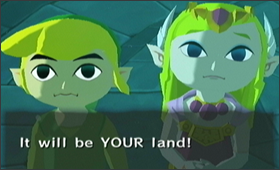 Perhaps the most convincing point wielded by the opposition is the fact that there is simply no way to provide these characters with fitting voices or spoken dialog. There is precedent for this in Nintendo as well. Dialog in most Mario games is unintrusive and entertaining; in Super Mario 64, it was often amusing. However, when fully-realized voice acting was finally implemented for the Mario series in Super Mario Sunshine, it came off as awkward and diluted. Conversations were just odd, and formerly bearable voices (Peach’s, for example) became grating in the extreme. To this day, you would be hard-pressed to argue that Mario characters are equipped to have audible conversations with each other. Outside of little snippets of voice acting, it simply doesn’t work. Dialog in Zelda games is often hyper-emotional, humorous, whimsical, and serious in ways best confined to literature, particularly children’s literature; adapting this text into proper conversation could be difficult. The characters simply aren’t made for it.
Perhaps the most convincing point wielded by the opposition is the fact that there is simply no way to provide these characters with fitting voices or spoken dialog. There is precedent for this in Nintendo as well. Dialog in most Mario games is unintrusive and entertaining; in Super Mario 64, it was often amusing. However, when fully-realized voice acting was finally implemented for the Mario series in Super Mario Sunshine, it came off as awkward and diluted. Conversations were just odd, and formerly bearable voices (Peach’s, for example) became grating in the extreme. To this day, you would be hard-pressed to argue that Mario characters are equipped to have audible conversations with each other. Outside of little snippets of voice acting, it simply doesn’t work. Dialog in Zelda games is often hyper-emotional, humorous, whimsical, and serious in ways best confined to literature, particularly children’s literature; adapting this text into proper conversation could be difficult. The characters simply aren’t made for it.
So while proponents of voice acting insist that Nintendo must move forward, many people within the ever-reactionary Zelda community insist that a series which has already strayed far from its roots must at least offer gamers the chance to contribute something to the world. While proponents of voice acting look to epic, successful titles like Mass Effect or Final Fantasy for proof that voice acting can be implemented successfully, Zelda fans see past failures as an argument against progression.
Unfortunately for the detractors, voice acting may be an inevitability for Zelda. It entered the Metroid universe as early as 2007 in Metroid Prime 3 and saw pervasive use in the most recent Metroid game, Other M. The game industry has moved on by this generation, and the Zelda series is perfectly primed to receive voice acting. Over the years, we have seen characters become more fully realized–whether through greater expressiveness or through richer backstories–and in Twilight Princess, the characters’ silence became increasingly awkward since they were animated to appear as though they were speaking. In Skyward Sword, they will probably remain silent. In handheld titles, Nintendo can still get away with keeping its major characters quiet as well. But there can be little doubt that, given the trends of the game industry as a whole, Nintendo will one day opt for spoken dialog and exposition.
Unlike the Mario franchise, in which dialog is not all that important to the progress of the games, Zelda titles are adventure games; as previously stated, plot points and even gameplay elements are disclosed through dialog. While this makes the prospect of spoken dialog frightening, it also makes it vital to the progression of the franchise, whether most of us believe such progress is necessary or not. Along with such voice acting come all the potential horrors of localization. Everyone, advocates of voice acting or not, should be concerned about this. Square had dabbled in realism with Final Fantasy VIII and even the cutscenes of Final Fantasy VII and IX, but when the company took the next step towards a fully cinematic experience in Final Fantasy X, results were mixed. Sure, you had believable narration (though opinions vary on Tidus’ voice acting), but you also had atrocious moments like the infamous laughing scene.
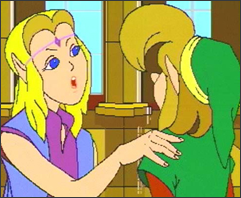 Will Zelda games regress into CD-i territory once again when the writing must be altered to accommodate dialog? Will the localization be as disastrous as historical failures like the first Resident Evil, given Nintendo’s limited experience with spoken dialog? Will Link and Zelda participate in a “laughing scene” of their own while on the run from Ganon’s minions? Given Nintendo’s handling of spoken dialog in Super Mario Sunshine, one can only wonder how long-winded and tedious the Zelda cutscenes could end up being. At the same time, just because Nintendo may one day decide to include voice acting in the Zelda franchise does not mean the games will automatically revert to CD-i quality. Given the quality of voice acting in recent releases like the Metroid games, we can rule out the extreme of terrible voice acting, in spite of Mario Sunshine’s bad precedent. If Nintendo handles voice acting carefully, it can at least be decent and put them on par with other franchises in that regard. While many Zelda fans (including myself) would rather have the Zelda characters remain silent than speak in any known language, let us assume, as I have, that voice acting would be an inevitability.
Will Zelda games regress into CD-i territory once again when the writing must be altered to accommodate dialog? Will the localization be as disastrous as historical failures like the first Resident Evil, given Nintendo’s limited experience with spoken dialog? Will Link and Zelda participate in a “laughing scene” of their own while on the run from Ganon’s minions? Given Nintendo’s handling of spoken dialog in Super Mario Sunshine, one can only wonder how long-winded and tedious the Zelda cutscenes could end up being. At the same time, just because Nintendo may one day decide to include voice acting in the Zelda franchise does not mean the games will automatically revert to CD-i quality. Given the quality of voice acting in recent releases like the Metroid games, we can rule out the extreme of terrible voice acting, in spite of Mario Sunshine’s bad precedent. If Nintendo handles voice acting carefully, it can at least be decent and put them on par with other franchises in that regard. While many Zelda fans (including myself) would rather have the Zelda characters remain silent than speak in any known language, let us assume, as I have, that voice acting would be an inevitability.
Nintendo should ensure that the original voice acting team does a good job, that localization efforts are successful, and that the spoken dialog fits the characters as well as the written dialog. This is all easier said than done. It’s also obvious and completely necessary. Unfortunately, there is no guarantee Nintendo will get everything right. Should they accomplish it, the Zelda franchise will stand among all other modern franchises. It would have moved itself into the future, but will not be particularly unique for having done so. Therefore, while it’s unlikely that future voice acting efforts would resemble the CD-i games, it seems as though sticking with the status quo, which has worked since the series’ inception, is the best idea because it is the least likely to result in any loss of quality.
Instead, I propose an alternative.
Alternative: Write All of the Dialog in Hylian
Nintendo has been giving Zelda characters voices at least since Link’s Awakening. In that game, Marin “sang” the Ballad of the Wind Fish, and this became a major plot point early on. Her singing obviously consisted of the trademark Game Boy beeps, but it still gave that 8-bit character a voice. This was followed in Ocarina of Time by having various characters–including Link–gasp, squeal and scream. None of this was voice acting per se, but it did allow us to “hear” the characters, much as we could hear Link’s Sword striking an enemy or a pot shattering against the floor. It saw considerable expansion in Twilight Princess. Few gamers, including those who seem to despise the very idea of voice acting in a Zelda game, have decried the decision to make Midna speak, even though she spoke in Twili every single time she participated in dialog with any character. Yes, the Twili language was garbled nonsense. Yes, she probably vocalized less than the on-screen dialog warranted. But the fact is that the Zelda franchise has had primitive voice acting of some kind and gamers either didn’t notice or welcomed it. The nature of this voice acting is what stands out. It’s unobtrusive because it is just noise, and fits into the world like all the other noise. Had Midna reacted to everything in a real language–whether English or Japanese–it could have been jarring. Because what she said fit in with all the other ambient noise and atmosphere of Twilight Princess, though, and was merely an expansion (albeit a significant one) of the garbled speech in previous Zelda games like The Wind Waker, it worked.
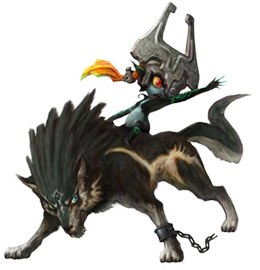 Other games have offered their own unique languages to great effect. Okami has a garbled style of its own, and the result is usually humorous–intentionally so. It’s a better example than Twilight Princess of how hearing characters speak, whether they are saying anything or not, can still allow the gamer to use his or her imagination while enhancing the audible aspects of the characters’ personalities. In Shadow of the Colossus, dialog is extremely sparse and the language is nonsense, but it is delivered an integral part of the world’s overall atmosphere. When bits of exposition are spoken by the booming, disembodied voice of a mysterious presence the player does not see, the effect is haunting and even a bit frightening. There is also Sega’s sleeper franchise, the Panzer Dragoon series. The first game, released in 1995 on the Sega Saturn, introduced the world to Panzerese, a unique language crafted specifically for the game (see example here). It drew influences from real-world languages (specifically Latin), but perhaps the most significant thing about it was that it was a real language created specifically for the games. The Panzer Dragoon games offered a unique aesthetic and culture, and the language was simply another part of that. At the same time, language was personal to the characters. Had the text simply been written, dialog may have seemed more exaggerated, without the subtlety of real human inflection. The voice acting was both unintrusive and extremely memorable. It enhanced both the fantasy aspects of the world and the realistic, human aspects of the characters, in large part because it was in a unique, well-made, and well-delivered language.
Other games have offered their own unique languages to great effect. Okami has a garbled style of its own, and the result is usually humorous–intentionally so. It’s a better example than Twilight Princess of how hearing characters speak, whether they are saying anything or not, can still allow the gamer to use his or her imagination while enhancing the audible aspects of the characters’ personalities. In Shadow of the Colossus, dialog is extremely sparse and the language is nonsense, but it is delivered an integral part of the world’s overall atmosphere. When bits of exposition are spoken by the booming, disembodied voice of a mysterious presence the player does not see, the effect is haunting and even a bit frightening. There is also Sega’s sleeper franchise, the Panzer Dragoon series. The first game, released in 1995 on the Sega Saturn, introduced the world to Panzerese, a unique language crafted specifically for the game (see example here). It drew influences from real-world languages (specifically Latin), but perhaps the most significant thing about it was that it was a real language created specifically for the games. The Panzer Dragoon games offered a unique aesthetic and culture, and the language was simply another part of that. At the same time, language was personal to the characters. Had the text simply been written, dialog may have seemed more exaggerated, without the subtlety of real human inflection. The voice acting was both unintrusive and extremely memorable. It enhanced both the fantasy aspects of the world and the realistic, human aspects of the characters, in large part because it was in a unique, well-made, and well-delivered language.
This alternative approach may well be one of the best things Nintendo can do for their characters and their franchise. Hylian is an existing language, so there is already a foundation. Developing it further, or changing it entirely, to be compatible with fully cinematic voice acting is a step in the right direction. In addition to moving the series forward without the trouble of intense localization that plagues so many Japanese franchises, it addresses concerns of both parties. Those who advocate voice acting will obviously be satisfied. If the voice acting is executed well, which is probably easier to do in a fictional language than in a real one, it will offer all the benefits that voice acting is supposed to offer. It moves the series forward so that it is on par with the ambitious, cinematic games of today. At the same time, it still allows us to use our imaginations; if we don’t know Hylian by heart, we can guess at why particular words are getting emphasis, or what the sentence structure might be. With the characters’ language firmly grounded in fantasy, emotional dialog will not seem childish, but believable. Ancient prophecies can be dispensed with seriousness, while comical moments can be even more whimsical than before. In Hylian, the possibilities are boundless, because we are less likely to impose real-world restraints and expectations on a language that, however grounded in real languages it may be, is foreign to us all.
In spite of the sleeper Panzer Dragoon series’ utilization of a unique language, this is something that is too rarely explored in the gaming world. In fictional literature such as Lord of the Rings, unique languages have given worlds a depth and mythology which, coupled with well-crafted geography and lore, made the worlds fully realized, believable locations. Hyrule is filled with vastly different cultures, complete with their own political systems, beliefs, and sages; imagine what different dialects or even languages could add to the increasingly well fleshed-out fantasy world that Nintendo has created. The developers could enrich the experience for fans and newcomers, both of whom will become more interested in the history of Hyrule. Most importantly, it will allow them to tailor voices, dialects, and word choice to the rhythms of each character’s personality and history. Instead of betraying the characters and lore, a possibility fans legitimately fear when considering voice acting in Zelda games, a Hylian language will become an inseparable element of that world.
If Nintendo never implements voice acting, their Zelda series will remain safely grounded in its present state. They can still continue to develop the lore and history of Hyrule, still give us more unforgettable adventures, but they would have passed up the opportunity to add another dimension to their immortal game franchise. If Nintendo decides to implement voice acting, an increasingly likely possibility given the current landscape of the industry, the company can accept it grudgingly as an unfortunate necessity, or they can use it to improve the experience by doing something different. All fans of the Zelda franchise should hope for the latter and optimistically embrace the possibilities it presents.
